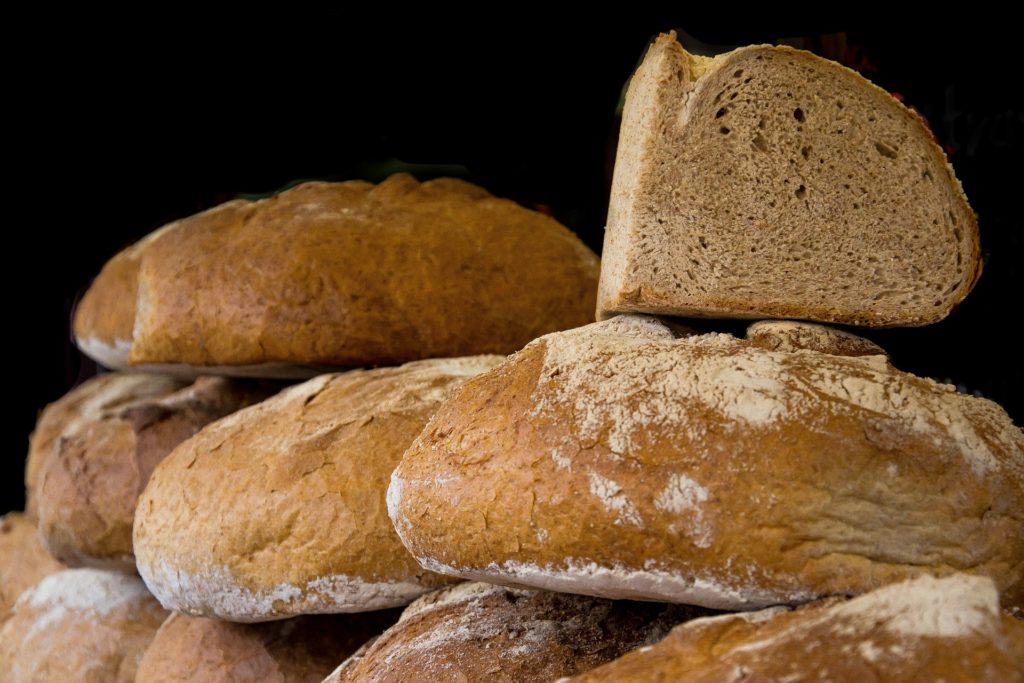
How do you store sourdough bread? To better answer this question, a little basic bread chemistry should help.
Sourdough breads or doughs are different than typical homemade white bread. They are more tangy and flavorful because they contain an acidic component such as buttermilk, watered-down yogurt, or cultured bacterial “starters.”
Starters are a small bit of dough that was preserved from the last time you made bread. The baker adds a bit more water and flour to the starter and then lets it ferment for a longer amount of time (2-24 hours) before adding the other bread components. This replaces any added “baker’s” yeast and provides the finished product its distinct flavor. There are several sourdoughs around the world, each with its distinct “starter” and flavor.
This depends on several factors such as the combination of bacteria and yeast culture and country of origin. One common bacteria and yeast combination is Lactobacillus sanfrancisco bacteria and Saccharomyces exiguus, a non-bakers yeast. These microorganisms are important during fermentation. The bacteria consume and break down maltose sugar to produce carbon dioxide and acetic and lactic acids. The acids are responsible for the distinct sour taste of sourdough bread. The yeasts also produce bread-leavening carbon dioxide and break down the byproducts of lactic acid fermentation.
You might also like: What Is A Leavening Agent In Baking?
Another characteristic of sourdough bread is the lack of the brown color for a baked product. This is because of increased acidity due to lactic acid production by bacteria and yeast. Browning reactions are slowed down by acidity.
Now that we’ve covered some of the basic things to know about sourdough bread, let’s discuss how it becomes stale and how to store it properly.
HOW SOURDOUGH BREAD STALES
It is worth noting that sourdough bread is different than regular yeast-leavened bread. It has higher hydration. Hence, it contains more moisture in the interior and a more tender and open crumb. Generally, the higher the hydration, the better. It helps delay crust forming, making the crust thinner as it forms.
The higher hydration also helps make the sourdough bread fresh for longer.
Staling starts as soon as the bread cools down after baking. It starts as the crumb begins to degrade as a result of the movement and evaporation of water. During baking, all of the water surrounding the starch travels inward. As the sourdough bread ages, the moisture evaporates, leaving a bread that is still tasty but not as fresh as the day it was baked.
Sourdough bread can be light and fluffy. However, as it ages, it becomes hard and dense. Water migration will continue until there are no more water molecules left for the reaction to occur. Bread that has gone stale will have a hard, dry surface.
You might also like: Shelf Life Of Common Refrigerated Foods
The good thing about sourdough bread is that it does not get moldy as fast as regular yeast-leavened bread. While molds love to live in damp or moist conditions, they do not prefer acidic environments, which sourdough breads are, all thanks to the good bacteria present.
But it is just one factor that preserves the freshness. Remember that sourdough breads are organic—no preservatives at all. Generally, (homemade) sourdough breads are at their peak of freshness within the first 24 hours. But it can last up to 5 days at room temperature.
To preserve sourdough breads and extends their shelf life, they should be properly stored.
METHODS OF STORING SOURDOUGH BREAD
Knowing how to store sourdough bread requires knowledge of its composition and chemistry, which we briefly discussed earlier.
There are several ways to store sourdough bread. But most of these methods have a disadvantage so these should be done properly. For example, wrapping the bread in a foil will prevent or reduce airflow, helping the bread to retain moisture for longer. But the moisture in the bread and the foil makes a great combination for molds to thrive.
You might also like: The Science Of Rising Bread (And Why Yours Is Not)
Some prefer to store bread in a paper bag. Paper bags are environmentally friendly, inexpensive, and visually appealing. They allow your bread to “breathe,” enabling moisture to escape gradually. This prevents mold to grow, and the beautiful crust to remain crisp. However, the permeability of a paper bag allows humidity to move. Thus, it will be hard for sourdough bread to maintain a soft inside.
If the bread has been sliced already, leave it on a breadboard cut-side down. This keeps the bread from drying out while preventing any moisture from accumulating on the crust.
If the bread is already on its 5th day, wrap the bread (whole or sliced) with plastic freezer wrap, sealable plastic bag or aluminum foil and store it in the freezer. If properly stored, frozen sourdough bread should maintain its quality up to 3 months. But the shorter the freezing duration, the better because the flavor diminishes over time. Once the bread is ready for use, simply take it out, thaw, and place it in a pre-heated oven.
You might also like: How Long Does It Take To Preheat An Oven?
One common misconception about storing sourdough bread is that it is fine to store it in the refrigerator. Well, never store leftover sourdough bread in the refrigerator. When bread is refrigerated, the starch molecules in the bread recrystallize considerably more quickly than they would at room temperature. Furthermore, the inside of the refrigerator will dry the bread out.


